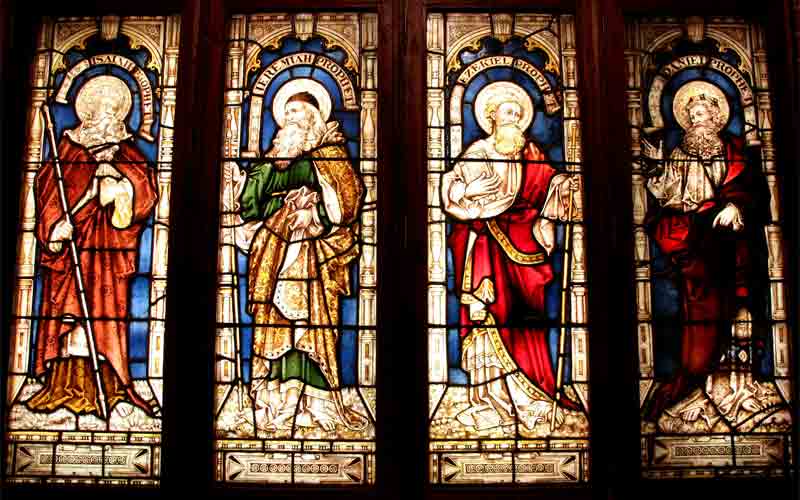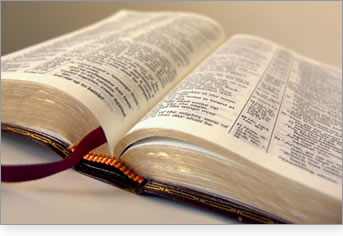
1 Kings 17:1-4 Now Elijah the Tishbite, who was of the settlers of Gilead, said to Ahab, “As the Lord, the God of Israel lives, before whom I stand, surely there shall be neither dew nor rain these years, except by my word.” 2 The word of the Lord came to him, saying, 3 “Go away from here and turn eastward, and hide yourself by the brook Cherith, which is east of the Jordan. 4 It shall be that you will drink of the brook, and I have commanded the ravens to provide for you there.”
Note to readers: If you would like to hear an audio message based off of today's blogpost, please click on the following link at: https://gcrpodcast.wordpress.com/2015/08/21/audio-sermon-gods-provision-a-character-study-on-the-prophet-elijah-1-kings-1719/
Introduction
Studying the prophets of the Bible is one of the most profitable studies one can do. Not only do we see God's incredible ability to inform us about future events and matters pertaining to salvation and the Lord Jesus Christ, but we also can learn some incredible truths about the walk of faith. In all honesty, everything I have just said factors into why anyone should study the prophets of the Bible. Elijah the prophet appears suddenly on the landscape of history. Unlike Moses or Samuel, there is no biography or accounts of Elijah's early childhood.
Inasmuch as Elijah's ministry was colored by dramatic manifestations of miracle working power from God, we are reminded in James 5:17-18 "Elijah was a man with a nature like ours, and he prayed earnestly that it would not rain, and it did not rain on the earth for three years and six months. 18 Then he prayed again, and the sky poured rain and the earth produced its fruit."
Inasmuch as Elijah's ministry was colored by dramatic manifestations of miracle working power from God, we are reminded in James 5:17-18 "Elijah was a man with a nature like ours, and he prayed earnestly that it would not rain, and it did not rain on the earth for three years and six months. 18 Then he prayed again, and the sky poured rain and the earth produced its fruit."
Today's post features this amazing man of God in regards to how God provided for him in the course of his life and ministry. In this brief character study of Elijah's life and ministry, we can learn lessons about God's provision. Let the reader note the following lessons about God's provision....
1. God is not limited by how He provides
In 1 Kings 17 we see God use ravens to feed Elijah. In the resource by author Willard Smith entitled: "Animals, Birds and Plants of the Bible", he notes about Ravens: "However the raven's unsavory reputation is deserved. It attacks smaller, weaker creatures, often pecking out their eyes. They are predatory by nature, feeding on carrion." I find it interesting how God can use anything, even so-called bad situations, to accomplish His intended ends.
In the same chapter, God uses a poor widow to feed the prophet. We read in 1 Kings 17:8 "Then the word of the Lord came to him, saying, 9 “Arise, go to Zarephath, which belongs to Sidon, and stay there; behold, I have commanded a widow there to provide for you.” The interesting thing about this provision is that God used a poor widow who was gathering her last meal to feed herself and her son. Then God in turn used Elijah to perform a miracle that ended up sustaining the widow and her child for nearly three years - on a handful of flour and a small amount of olive oil!
Then in 1 Kings 19 we find the desperate prophet being fed by an angel. God's use of angels is amply documented in the Word of God. We know that He uses them in aiding His people (Psalm 91:11; Hebrews 1:7,14). So as we can see from Elijah's life, God is unlimited in how He can provide. 2 Corinthians 9:8 reminds us - "And God is able to make all grace abound to you, so that always having all sufficiency in everything, you may have an abundance for every good deed."
In the same chapter, God uses a poor widow to feed the prophet. We read in 1 Kings 17:8 "Then the word of the Lord came to him, saying, 9 “Arise, go to Zarephath, which belongs to Sidon, and stay there; behold, I have commanded a widow there to provide for you.” The interesting thing about this provision is that God used a poor widow who was gathering her last meal to feed herself and her son. Then God in turn used Elijah to perform a miracle that ended up sustaining the widow and her child for nearly three years - on a handful of flour and a small amount of olive oil!
Then in 1 Kings 19 we find the desperate prophet being fed by an angel. God's use of angels is amply documented in the Word of God. We know that He uses them in aiding His people (Psalm 91:11; Hebrews 1:7,14). So as we can see from Elijah's life, God is unlimited in how He can provide. 2 Corinthians 9:8 reminds us - "And God is able to make all grace abound to you, so that always having all sufficiency in everything, you may have an abundance for every good deed."
2. God is not limited by what He can provide
In 1 Kings 17 God uses food in the feet and beaks of birds to feed Elijah. In the same chapter he uses even less food from a poor widow to feed the prophet. In 1 Kings 19, God uses food from seemingly nowhere to feed the prophet by the hand of an angel. Undeniably God's ability to provide is not limited by the quantity of available resources. Afterall, He literally created our universe and world out of nothing. Romans 4:17 states - "(as it is written, “A father of many nations have I made you”) in the presence of Him whom he believed, even God, who gives life to the dead andcalls into being that which does not exist." So by the life of Elijah, we learn that when it comes to God's provision, God is unlimited in how he provides and by what He can provide. There is one more lesson we can consider before closing out today's post....
3. God is always able to provide
When we consider all three episodes above, all three episodes are noted for their scant to non-availability of resources. In all three cases, God proves that He is able to provide. In all three cases, Elijah is dependent on God's ability to provide. In all three cases, Elijah is caused to see God's hand and ultimately to hear His voice. On the outward appearance of things, it would seem that Elijah's situation grows from bad to worse. Yet, we see God drawing Elijah closer and closer to Himself and further away from dependence on the acceptance of men or the ease of circumstances.
Closing thoughts
In closing out today's post, we learned that when considering Elijah's life, we learn the following three principles about God's provision:
1. God is unlimited in how He can provide
2. God is unlimited by what He can provide
3. God is always able to provide
Three scriptures from the New Testament provide good reminders to reinforce the above truths. First, Romans 8:32 states - "He who did not spare His own Son, but delivered Him over for us all, how will He not also with Him freely give us all things?" Or how about Philippians 4:19 "And my God will supply all your needs according to His riches in glory in Christ Jesus." Then one more verse, 2 Corinthians 12:9 "And my God will supply all your needs according to His riches in glory in Christ Jesus." Thank you Lord for how you teach us by your prophets your ability and willingness to provide.
Closing thoughts
In closing out today's post, we learned that when considering Elijah's life, we learn the following three principles about God's provision:
1. God is unlimited in how He can provide
2. God is unlimited by what He can provide
3. God is always able to provide
Three scriptures from the New Testament provide good reminders to reinforce the above truths. First, Romans 8:32 states - "He who did not spare His own Son, but delivered Him over for us all, how will He not also with Him freely give us all things?" Or how about Philippians 4:19 "And my God will supply all your needs according to His riches in glory in Christ Jesus." Then one more verse, 2 Corinthians 12:9 "And my God will supply all your needs according to His riches in glory in Christ Jesus." Thank you Lord for how you teach us by your prophets your ability and willingness to provide.







